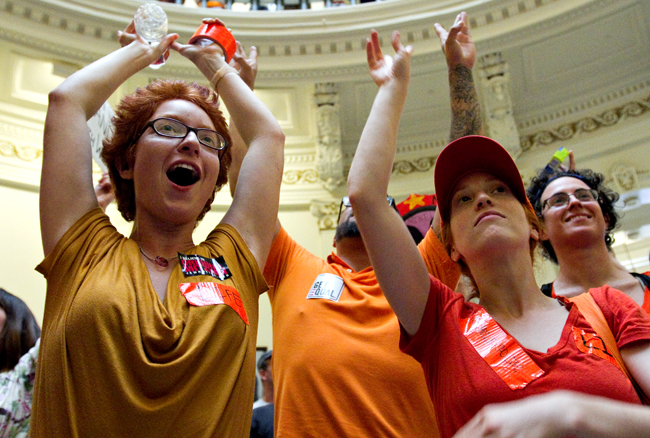As of Tuesday, abortions performed after 20 weeks are illegal in the state of Texas. That change comes by way of House Bill 2, the same piece of omnibus abortion legislation that set the Texas Capitol ablaze in a flame of orange and blue-clad protesters this past July. This development was set to be a clear win for anti-abortion advocates, but a U.S. District Court decision has cast a shadow over that victory.
The decision, made less than 24 hours before portions of HB 2 were set to go into effect, blocked one provision of the legislation and partially blocked another in response to a lawsuit brought by a group of plaintiffs that included Planned Parenthood, the reproductive health organization.
The decision by District Judge Lee Yeakel, though hailed by many pro-abortion rights advocates as a victory, will not stop the unchallenged portions of HB 2 from going into effect. The state of Texas has already filed an appeal with the U.S. Court of Appeals for the Fifth Circuit, which, as the Texas Tribune’s Becca Aaronson reported Monday, “has recently upheld numerous laws that restrict abortion.”
Still, despite the decision’s potential impermanence should it be overturned, the ruling still offered a refreshing outside acknowledgement of the actual purpose of the law: to restrict reproductive freedom.
Moreover, the decision made Monday in no way impacts the two most controversial provisions of HB 2: the ban on abortions after 20 weeks — which, as previously mentioned, is effective as of Tuesday — and the requirement that abortion providers upgrade their facilities to meet the standards of ambulatory surgical centers by September 2014. The latter is expected to force abortion centers across the state to close should they be unable to fund upgrades to their facilities. Neither of these provisions was challenged in court by the plaintiffs.
Of those provisions that were challenged, however, only one, the requirement that doctors have admitting privileges at nearby hospitals, was struck down completely. The other, which makes it illegal for doctors to prescribe that women take abortion-inducing drugs outside their doctor’s office — a practice which is against FDA protocol but which allows women to go through the painful side effects of the medication in the privacy of their own home — was declared constitutional only in the case that the mother’s life or health is in danger.
In other words, if this ruling is upheld, the number of doctors that qualify to perform abortions will not be reduced by HB 2 and doctors may still prescribe abortion-inducing medicines for at-home use if the mother’s life or health is in danger.
So yes, the victory for pro-abortion rights advocates is partial and potentially temporary, should a higher court side with the state’s appeal. But the decision offers a confirmation of what pro-abortion rights advocates suspected all along: Despite the claims of the bill’s supporters that HB 2 was an attempt at improving women’s health, the admitting privileges provision failed the legal “purpose” test. This means that the underlying purpose of the law, in Yeakel’s opinion, was not to improve women’s health, but “to hinder autonomous reproductive choice.”
And though Yeakel didn’t overturn the provision relating to abortion-inducing medicine, he did so on the basis that the state had the right to prefer one medical procedure or protocol over another, not on the basis that the state was protecting women by doing so. In fact, the ruling explicitly stated that the FDA protocol required by HB 2 “is assuredly more imposing and unpleasant for the woman.”
The language of the district court’s ruling validates the frustration of those who spent the summer protesting against legislators who claimed that HB2 was “for the good of women.” HB 2 isn’t that great for women, after all, but that doesn’t necessarily make it unconstitutional.
“No ruling of this court will sway the opinion regarding abortion held by anyone,” Yeakel wrote in his opinion. Sure enough, with the ruling out, opinions have yet to change and both sides will continue waging wars over abortion rights.
Editor's note: A previous version of this story used the phrase "pro-abortion" in the article title. The title should have used the phrase "pro-abortion rights."





















